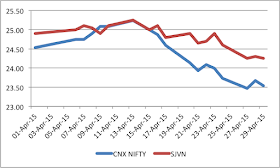The real test for the quality
of a stock portfolio is the bear market. For in a falling stock market only
best shares hold their price.
In April, 2015, the CNX NIFTY
Index of the national stock exchange fell steeply. Stock prices corrected
sharply, spreading pain all round. All stock charts followed only one direction
– down. Stock market news columns and papers screamed words like slaughter and blood.
But a small beauty, SJVN
Ltd., held its ground. See the graph below:
 |
| Falling CNX NIFTY and How fundamentally strong stocks defy falling markets |
Coming to the point on valuations, the Price to Earnings (PE) Ratio of NIFTY is 22.29 times the earnings, on 29th April, which is very high. On the contrary the PE ratio of SJVN on 29th April closing price is just 9.01. A PE multiple of maximum 10 is one of the key prescriptions of value investing.
Therefore, SJVN with a PE of a mere 9.01 is less battered compared to NIFTY, which is unreasonably valued.
Besides a low and highly attractive PE Ratio, SJVN Ltd. has very strong balance sheet and fundamentals.
SJVN Ltd.
SJVN Ltd. is a joint venture public sector company. The joint venture is between the Government of India and government of Himachal Pradesh. It enjoys the status of a Mini Ratna company. For the year ending 31st March 2016, the company displayed following strengths:
- EBDITA Margin: 81.94%
- Net Profit Margin: 62.85%
- Current Ratio: 5.88 (2 above means strength)
- Debt-Equity (long-term) Ratio: 0.31 (should be less than 1)
- Total Outside Liabilities to Tangible Net Worth (TOL/ TNW): 0.40 (ideal below 3)
No wonder that this small but fundamentally strong company was successful in holding its turf.
In conclusion, in a falling stock market best shares hold prices and protect investors' wealth. But many big and popular companies but having weak balance sheets but enjoying very high valuations in the stock market, see deep stock price erosion.

